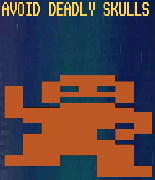|
Is it for a job interview or just a game that you are thinking of picking up? There's such a stigma against store bought assets that the latter is definitely rude. if you're potentially working with them it's a fair question. I guess if it was someone you'd became friends with/have a regular conversation about development with then it crosses back over into ok. If someone asked me a question out of the blue which carried that much baggage and said it was just out of their personal curiosity, i would not believe them.
|
|
|
|

|
| # ? Apr 27, 2024 03:56 |
|
cubicle gangster posted:Is it for a job interview or just a game that you are thinking of picking up? yeah good point. im asking from the perspective of an environment artist who's curious about selling assets on the unity/unreal stores myself. without that context it would definitely be uncouth
|
|
|
|
Kanine posted:is it rude for me to ask an indie developer if they're using store assets or if they're producing them in-house? if i do im going to preface it with saying both are valid, and that im asking mostly out of curiosity If its a twitter interaction, I'd probably use it as an excuse to boost the profile of my artists by complimenting their work and tagging them in.
|
|
|
|
Kanine posted:yeah good point. im asking from the perspective of an environment artist who's curious about selling assets on the unity/unreal stores myself. without that context it would definitely be uncouth I think if you start with. "I'm an environment artist looking to selling assets on the unity/unreal stores myself and I like the assets in your game. Did you buy them or make them yourself. They seem to really fit your art style and be cohesive." Then it won't come off as too rude. As a programming based dev, I don't find it rude to ask about purchased but if someone just asked "are those assets from the store" directly on twitter I would assume it was a line of attack. It's a common refrain among lazy criticism to call everything "an asset flip". While there are some games that are (where they not only take art but also the entire game-play logic), but calling something like Onward or Pavlov an asset flip is insane.
|
|
|
|
You can also pose the question a bit more indirectly, which I think would help. Something like: "I'm an artist aspiring to sell assets on the Unity/Unreal store, and I'm wondering about your company's opinion of these stores - do you find them a useful source of assets for your games?" I don't think that would be too rude. It's all in the phrasing of the question. Putting it as a general question about a developer's attitude towards asset stores will net you pretty much the same answer without coming off as a slight on their own assets. Maybe don't go "Hey I heard you bought your NERD at the NERD STORE, like NERDS, is that true?"
|
|
|
|
Echoing what Stick100 said, the question isn't rude so much as it is presumptuous in the sense that you're assuming a dev is going to talk to you, a total stranger, about their art pipeline & development methodologies. Also, you have nothing to lose and everything to gain by putting an asset or asset pack up on the Unity store (or equivalent.) I personally know of two instances where a dev contacted and eventually hired an artist based solely on the quality of the assets they had been posting on a storefront. Even though there *is* a lot of crap out there, the quality bar is rising every day and great art will get people's attention no matter where it's being sold.
|
|
|
|
I've thought a lot about doing music packs for those stores. Most of the ones I've seen on those stores don't seem very good to my ears, so smashing out a few themed packs (orchestral fantasy, sci-fi, maybe detective noir jazz, and so on) could be a decent little earner.
|
|
|
|
i wonder if there's any less inclination for studios to do physical art books for games since concept/3d art from games is easier to find online now?
|
|
|
|
Kanine posted:i wonder if there's any less inclination for studios to do physical art books for games since concept/3d art from games is easier to find online now? Last two games shipped we had one of the Indipress printed books made for the game team. Print on demand rules for that.
|
|
|
|
If we're talking things like special edition bonuses, people don't typically buy art books because they want to see the art anyway, they tend to think of them as premium or collector's items.
|
|
|
|
I'm not exactly sure what the best way to frame this question is so I guess I'll just get into it. About a year ago I got sick of traveling all the drat time and decided to get into game development after spending about 7 years in the corporate space and working on stuff on and off in my free time. I figured it would probably take me at least a year+ to get my footing and release something that might be tenable for a public of a retail game. This lead to a year of jamming on various game jams and POCs of a bunch of different variety of genres (VR sports, platforming 2D/3D, puzzle games, multiplayer party games, etc) on everything from JavaScript to C++ / UE4, including modeling, texturing, sound design and everything else. So, my question for the seasoned game devs out there would be this - How do you translate this experience into something that a developer could look at and say "yeah, I'd hire that guy"? Is this a function of networking or having a good portfolio, or some secret sauce I have yet to think about? And how much would the corporate IT experience play into a decision, assuming it's in the software development space? I realize that the cadence of development would be different but I'm assuming this would be relevant as far as understanding org structures, timelines, operational dependencies and effective communication. Also, I was at PAX West a few weeks ago and I was wondering from the Indie devs - how do you feel when another indie developer tries to pick your brain about the development process and the technology being used in your games?
|
|
|
|
Cpt. Obvious posted:Also, I was at PAX West a few weeks ago and I was wondering from the Indie devs - how do you feel when another indie developer tries to pick your brain about the development process and the technology being used in your games? I'm not Indie, but do ask a looot of devs questions at PAX: People are generally cool about it, especially if you preface "here are all my questions" with "hi, i'm a developer/producer/bleh trying to learn more for this reason, can you help me out?" Like, I was also at PAX West (remember to always go to the speedrun panel), and asked a lot of devs a lot of questions. A couple devs I had longer 20ish minute conversations with, but I reached out to them well in advance about those. Indie devs are generally super cool! You just need to be respectful, respect their time, etc. Don't be a stereotypical goon I guess.
|
|
|
|
Cpt. Obvious posted:I'm not exactly sure what the best way to frame this question is so I guess I'll just get into it. Your corporate development history along with a mention of hobby game dev should get you in the door for programming. You may (or may not) get a title cut. You will probably get a pay cut; especially relative to FAANG or fintech.
|
|
|
|
Cpt. Obvious posted:I'm not exactly sure what the best way to frame this question is so I guess I'll just get into it. I can't speak for anyone else, but having recently interviewed people for mid to senior programmer positions, what we look for in a candidate is basically: - Prior industry experience and/or relevant education; video game development is good, but any professional development experience helps to convince us you're someone who has seen and solved some poo poo and can work in an environment where every single developer has to take a lot of personal responsibility for solving issues and getting the work done. Education is secondary, but it certainly helps. It also helps to know you're familiar with common industry tools and processes, although I would never turn down someone just because they hadn't used Perforce or anything like that. It's always expected for a new hire to spend some time getting used to the work process. - Motivation to work in the video game industry; I hesitate to use the word "passion" because I don't want to imply we expect anyone to devote their lives to their workplace, but this is a creative field and experience shows that people who enjoy their work are typically better at it. Here's where having a portfolio of hobby projects really helps. If you can let me play a demo of something you made yourself and discuss the technical challenges you faced doing it, that goes a long way. - Good cultural fit; this has nothing to do with professional experience, I just want to feel like you're able to get along with other people socially. Just being a normal person is all it takes, really. It's pretty rare that I've had my doubts about a candidate on these grounds, but it has happened. If nothing else, people who have trouble integrating socially at the work place have a tendency to resent their work and eventually leave, and that doesn't make anyone happy. Cpt. Obvious posted:Also, I was at PAX West a few weeks ago and I was wondering from the Indie devs - how do you feel when another indie developer tries to pick your brain about the development process and the technology being used in your games? Personally, I will talk your ear off about how we do things if you so much as imply you're interested. But it's worth keeping in mind that depending on the size of the company, the people on the floor at PAX may not be the people most suited to talk about production and may not be able to help you. We typically send marketing and PR people, for example, not developers. Hyper Crab Tank fucked around with this message at 20:44 on Sep 16, 2019 |
|
|
|
Cpt. Obvious posted:I'm not exactly sure what the best way to frame this question is so I guess I'll just get into it. Part of it is having this all available on a website w/ playable builds. Itch.io is great for hosting stuff. I can't speak much on hiring processes across the industry, but as someone who works for a smaller studio we love seeing a pretty broad spectrum of projects and abilities. Generally we want to see something we could consider "shipped" in that it's on a platform and playable, but we have a lot of people who prior to working here are what I'd call veteran game jammers. Networking is like... eh? You can find jobs by going to networking events if you're lucky but a real network is just built by being part of the local community, demoing your stuff and talking to people regularly. Obviously much easier to do if you're already in a city that has a thriving dev community like Austin, Portland, Madison, or many cities in California (assuming US because of my own biases). IT roles can always be useful since a lot of larger studios have DevOps stuff that needs to be done, but I have no idea how well that transfers into the game programming space. At a smaller studio it might mean you become the Build Server Person(tm). I know some of our programmers were hired because they had a demo that made us go "what the gently caress," like the guy who reverse-engineered our game, wrote a patching system for it (based on an engine bug that we're not allowed to disclose) and added his own content to the game (including his cover letter). Not every studio's gonna play that game demo, but if you have the coding chops and can make something that is undeniably technically impressive you'll probably turn some heads.
|
|
|
|
So, when building a portfolio for the purpose of getting hired, would it make more sense to have one good demo that's polished to hell and back or a handful of smaller ideas to show a breadth of game play experiences?
|
|
|
|
Cpt. Obvious posted:So, when building a portfolio for the purpose of getting hired, would it make more sense to have one good demo that's polished to hell and back or a handful of smaller ideas to show a breadth of game play experiences? For engineering? Go deep on the skills needed to work in your target companies. But people may not even look at your reel. Know CS and machine fundamentals. Design is different, but I canít speak to it as much. Be prepared to talk about why you made various decisions and how alterations would affect things downstream.
|
|
|
|
If this is not the right kind of content for this thread my bad, but I've been developing this game for the past year and a bit and it's going to launch some time next month. For anyone into idle games, do you have feedback on the store page as it's set up currently? https://store.steampowered.com/app/1147690/NGU_IDLE/ Thanks in advance!
|
|
|
|
You'll probably get more feedback in this thread https://forums.somethingawful.com/showthread.php?threadid=3506853
|
|
|
|
drat, sorry!
|
|
|
|
Kanine posted:is it rude for me to ask an indie developer if they're using store assets or if they're producing them in-house? if i do im going to preface it with saying both are valid, and that im asking mostly out of curiosity I come from business software, and there is no question too rude, if you are at an actual job interview, when it's related to the general workflow even if it's just probing what are the signs of working conditions.
These are all questions pertaining to business software so YMMV, but there is no such a thing as a bad question, only a question that has not been made and you will regret later. Whoops! Nice football table you have there! Too bad I have been promoted to Senior Vice Assistant Producer and I have also to fix this bug for 3.00 AM before we go GOLD. edit: misread what was the context, but hopefully it's useful
|
|
|
|
i appreciate the advice, i get where ur coming from.
|
|
|
|
also i have a general question for the thread, who's been your oldest coworker working in game development? i was in a slack chat with a coworker and i realized he must be in his early 60's based on how he looks. (there's nothing inherently wrong with this, but i was surprised to see that considering we work in an industry well-known for burning people out)
|
|
|
|
Havenít specifically asked but in their 50ís for sure, especially at a larger studio with a reputation for stability. My oldest coworker now (out of ~23 people) is... 42, I think?
|
|
|
|
Kanine posted:also i have a general question for the thread, who's been your oldest coworker working in game development? 62, the lead of a Web Tools team.
|
|
|
|
edit: oh hi, new pageDreadCthulhu posted:Re: indie projects, was there a secret sauce behind some of my favorite teams such as Thatgamecompany and Supergiant games? All industry veterans? Did dozens of indie projects before striking gold? Magical confluence of all the right talent at the right time? leper khan posted:Survivor bias. Definitely survivor bias, but I think there's more than that. They didn't come from nowhere. For thatgamecompany, Jenova Chen's student projects were already very well-received. For Supergiant, the studio came from the Command and Conquer/Red Alert games. When they started their studios, they both probably already had some way to get at least a single look at their game from the media and from the console companies. And then they made good games on a (presumably) strict budget and timeline.
|
|
|
|
One of the skills that people undervalue is the ability to finish games, and that is something you often get beaten into you by time at "larger" studios. Your technical chops don't matter if you can never ship the damned thing, and I suspect learning how to balance that with other considerations plays into some instances of success.
|
|
|
|
Also worth noting that most developers of successful niche titles had either development experience, money, or both before they were successful in games.
|
|
|
|
I'd also say that it doesn't hurt as a small indie developer to have very strong connections to people who write about games for a living. Greg from Supergiant was editor at Gamespot for years before he ever became a developer, so he had built in awareness of anything he was involved with.
|
|
|
|
Whistling rear end in a top hat posted:I'd also say that it doesn't hurt as a small indie developer to have very strong connections to people who write about games for a living. Greg from Supergiant was editor at Gamespot for years before he ever became a developer, so he had built in awareness of anything he was involved with.
|
|
|
|
Hi folks, I'm not a game developer but I'm taking a computer engineering course where we have to make a game on a little microcontroller with a 7x5 LED screen. I decided to make Tetris! It's incomplete, I still need to fix the flashing LEDs for one but I'm very proud of my work and I need to share it with everyone! https://www.youtube.com/watch?v=TM7WG1yfMYU
|
|
|
|
https://www.theverge.com/2019/10/9/20903139/indie-game-developers-creators-money-funding Some eye opening examples...
|
|
|
|
Turin Turambar posted:https://www.theverge.com/2019/10/9/20903139/indie-game-developers-creators-money-funding I am noticing the throughlines that --Steam is awful and margins are thinning --While the struggle is real all over, the USA is an absolute hell nation
|
|
|
|
Willie Tomg posted:I am noticing the throughlines that Steam was only brought up by one of the developers, I wouldn't call that a throughline.
|
|
|
|
Willie Tomg posted:--Steam is awful and margins are thinning Cost to produce games of some quality X have been constantly going down. I have no idea how you'd even come to this conclusion. You could instead argue that getting mindshare of any kind of is becoming more difficulty (because cost of production is plummeting), which results in lower sales, but the statement 'margins are thinning' is incorrect. Furthermore, Steam is pretty drat great as a service - yes, for developers too. 30% is kind of a bummer, but to suggest that Steam isn't offering some nice features in return is pretty dishonest. Steamworks gives you a lot of stuff 'for free'. There is a different argument to be made about how maybe the mainstream audience expects high production value, but that applies less to the indie scene.
|
|
|
|
Steam has a reputation for structural, severe problems with how it handles the visibility of products, in many ways, much worse than it has any reason to be.
|
|
|
|
To be fair, it's not exactly an easy problem to solve. Steam's efforts for years have been geared towards finding a way to get games in front of people that are likely to buy them that doesn't require spending countless man-hours on curation. There are millions of people with Steam accounts with diverse tastes, budgets, available time each week to play video games, computer hardware, what have you. Ultimately Steam's goal aligns with that of both customers and developers - getting games into the hands of the people who want to play them - and there really isn't another platform today that offers what Steam does with the same availability to developers. It would be great if there were for competitive purposes, but there isn't. As for cuts, it's worth remembering that 30% was a great sight better than what you'd get from a brick-and-mortar publisher back in the day, and frankly still is. Whether that should be the cut or not, I don't know, but there are a lot of industries out there that make far more complicated things and get a much smaller cut of the final sale value than 70%. I'm not sure what that article is trying to convey, really. Not a lot of those people mentioned what they actually got from sales, it's mostly about various government financial aid programs. I get the feeling from what little information there is in the article that a lot of these people didn't really have a lot of financial stability to begin with. Look, cold hard reality is that small-time video game development is a high-risk venture at the best of times, and if you're scraping by as it is then solo or small-group independent development is not the horse you want to hitch your wagon to. There is too much noise out there to be risking your health and financial future on a product that doesn't stand out, and even then it's a crapshoot unless you have contacts with a good publisher that can help you with marketing. (And, to be even more frank, this goes double if you're making some incredibly niche and/or artsy-rear end title that doesn't have a lot of mass appeal even if people do notice it.) Hyper Crab Tank fucked around with this message at 23:15 on Oct 19, 2019 |
|
|
|
If you want to talk about horrible visibility, try developing for mobile where you are hosed by Apple wholesale or screwed by Google and trying to go outside those two storefronts is pointless or next to impossible (Apple). Steamís rev cut and store issues are superior in every way compared with the hellscape that is mobile storefronts and development. Hands down. Developing for Steam is also a dream compared to consoles where youíve got tighter margins, larger overhead, rev share plus the sometimes terrible first party requirements and oversight.
|
|
|
|
Devs seem positive about Apple Arcade and to their credit Apple is happily taking on quality games that would've easily gotten a publishing deal on other platforms. And then Google follows suit with a similar program except devs will get paid based on metrics that are only feasible for timer based skinner boxes.
|
|
|
|

|
| # ? Apr 27, 2024 03:56 |
|
It's important to mention though that Apple Arcade is a massive step away from what has been the standard for mobile games since the inception of the App Store over a decade ago, and we have yet to see exactly how that will pan out. The vast majority of mobile gaming is still a quagmire of garbage that is virtually impossible to penetrate with a new product without significant impetus behind you already (e.g. a well-known franchise) or extraordinary amounts of luck.
|
|
|



































